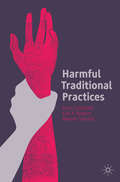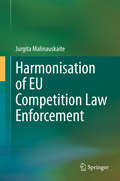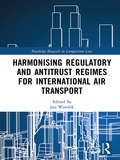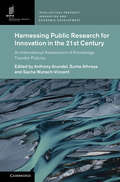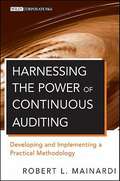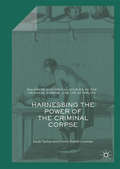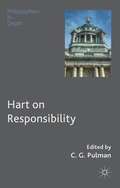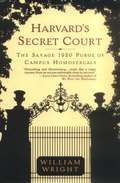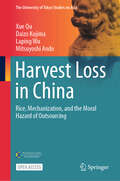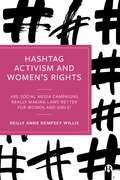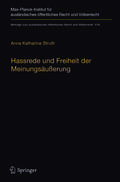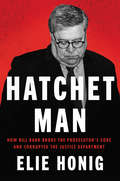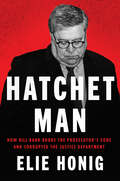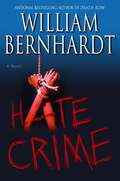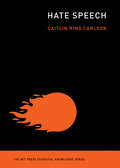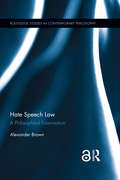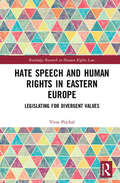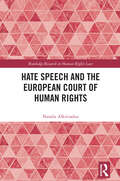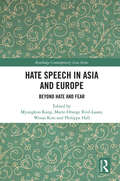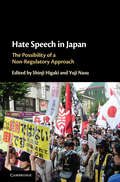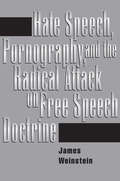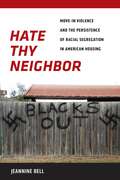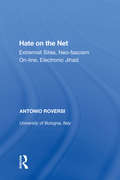- Table View
- List View
Harmful Traditional Practices: Prevention, Protection, and Policing
by Gerry Campbell Karl A. Roberts Neelam SarkariaThis book is about harmful traditional practices: damaging and often violent acts which include female genital mutilation, forced marriage, honour killings and abuse, breast ironing, witchcraft and faith-based abuse. Often targeting women and young girls, these practices are often justified on spurious religious or traditional grounds but are all forms of abuse. Roberts, Campbell and Sarkaria have backgrounds in psychology, policing and law and have spent many years working at the forefront of attempts to end these practices. Harmful Traditional Practices is therefore a uniquely pragmatic book which aims to inform readers about these acts while identifying the best approaches towards ending and prosecuting against them.
Harmonisation of EU Competition Law Enforcement
by Jurgita MalinauskaiteThis book explores how the EU’s enforcement of competition law has moved from centralisation to decentralisation over the years, with the National Competition Authorities embracing more enforcement powers. At the same time, harmonisation has been employed as a solution to ensure that the enforcement of EU competition rules is not weakened and the internal market remains a level playing field.While employing a comparative law argument, the book, accordingly, analyses the need for harmonisation throughout the different stages of development of the EU’s competition law enforcement (save Merger control and State Aid), the underlying rationale, and the extent to which comparative studies have been undertaken to facilitate the harmonisation process from an historical perspective. It also covers the Directives, such as the Antitrust Damages Directive and the ECN+ Directive. Investigating both public and private enforcement, it also examines the travaux préparatoires for the enforcement legislation in order to discover the drafters’ intent. The book addresses the European and the Member States’ perspectives, namely, the Central and Eastern European (CEE) countries, as harmonisation proceeds through dialogue and cooperation between the two levels. Lastly, it explores the extent to which harmonisation of the competition law enforcement framework has been accepted and implemented in the Member States’ legal systems, or has led to the fragmentation of the national systems of the CEE countries.
Harmonising Regulatory and Antitrust Regimes for International Air Transport (Routledge Research in Competition Law)
by Jan WalulikHarmonising Regulatory and Antitrust Regimes for International Air Transport addresses the timely and problematic issue of lack of uniformity in legal standards for international civil aviation. The book focuses on discrepancies within the regulatory and antitrust framework, comprehensively reveals the major legal limitations and conflicts, and presents possible solutions thereto. It discusses possible strategies for multilateralisation and defragmentation of air law, and for international harmonisation of airline economic regulation with fair competition standards. This discussion extends to competition between air transport law and other legal regimes as well as to specific regulatory problems related to air transport. The unique feature of the book is that it reconciles distinct perspectives on these issues presented by renowned aviation and aerospace experts who represent the world’s key air transport markets and air law academic centres. By providing unbiased solutions that could serve as a base for future international arrangements, this book will be invaluable for aviation professionals, as well as students and scholars with an interest in air law, economic regulation, antitrust studies, international relations, transportation policy and airline management.
Harnessing Foreign Investment to Promote Environmental Protection
by Jorge E. Viñuales Pierre-Marie DupuyHarnessing Foreign Investment to Promote Environmental Protection investigates the main challenges facing the implementation of environmental protection and the synergies between foreign investment and environmental protection. Adopting legal, economic and political perspectives, the contributing authors analyse the various incentives which encourage foreign investment into pro-environment projects (such as funds, project-finance, market mechanisms, payments-for-ecosystem services and insurance) and the safeguards against its potentially harmful effects (investment regulation, CSR and accountability mechanisms, contracts and codes of conduct).
Harnessing Public Research for Innovation in the 21st Century: An International Assessment of Knowledge Transfer Policies (Intellectual Property, Innovation and Economic Development)
by Sacha Wunsch-Vincent Anthony Arundel Suma AthreyeUniversities and public research institutes play a key role in enabling the application of scientific breakthroughs and innovations in the marketplace. Many countries – developed and developing alike – have implemented national strategies to support the application or commercialization of knowledge produced by public research organizations. Universities and public research institutes have introduced practices to support these activities, for instance by including knowledge transfer to promote innovation as a core part of their mission. As a result, a vital question for policymakers is how to improve the efficiency of these knowledge transfer practices to help maximize innovation-driven growth and/or to seek practical solutions to critical societal challenges. This book aims to develop a conceptual framework to evaluate knowledge transfer practices and outcomes; to improve knowledge transfer metrics, surveys and evaluation frameworks; and to generate findings on what works and what does not, and to propose related policy lessons. This book is also available as Open Access.
Harnessing the Power of Continuous Auditing
by Robert L. MainardiWritten to help auditors jump start their organization's near real-time financial data monitoring and sharing capabilities, Harnessing the Power of Continuous Auditing provides step-by-step instruction on how to build, market, implement, and manage a successful continuous auditing program.Taking concept to reality, author and internal audit expert Robert L. Mainardi presents auditors, company executives, business unit managers, practitioners, and consultants with a complete road map to continuous auditing, from start to finish. Beginning with a thorough definition of the subject, Mainardi debunks the various myths surrounding the process?including the most common misperception that the internal audit department must have the corresponding automated technology to support it?and includes numerous documented proven techniques and instructions for more effective SOX work.A vital tool to enhance the auditor's skills and abilities, Harnessing the Power of Continuous Auditing's exhaustive coverage includes: The definition of continuous auditing Where to begin Methodology development Preparing for continuous auditing Root cause analysis Action plans Problem-solving tools Lessons learned Selling continuous auditing Conditions and challenges This all-in-one handbook of practical execution provides much-needed, accessible guidance on everything business professionals need to know to conduct and implement a successful continuous audit in their organizations.
Harnessing the Power of the Criminal Corpse (Palgrave Historical Studies In The Criminal Corpse And Its Afterlife Ser.)
by Sarah Tarlow Emma Battell LowmanThis open access book is the culmination of many years of research on what happened to the bodies of executed criminals in the past. Focusing on the eighteenth and nineteenth centuries, it looks at the consequences of the 1752 Murder Act. These criminal bodies had a crucial role in the history of medicine, and the history of crime, and great symbolic resonance in literature and popular culture. Starting with a consideration of the criminal corpse in the medieval and early modern periods, chapters go on to review the histories of criminal justice, of medical history and of gibbeting under the Murder Act, and ends with some discussion of the afterlives of the corpse, in literature, folklore and in contemporary medical ethics. Using sophisticated insights from cultural history, archaeology, literature, philosophy and ethics as well as medical and crime history, this book is a uniquely interdisciplinary take on a fascinating historical phenomenon.
Hart On Responsibility
by Christopher PulmanA collection of essays discussing Herbert Hart's writings on responsibility. The essays focus upon Hart's work on causation in the law and on the justification of punishment. Specific topics discussed include senses of 'responsibility', voluntariness, Mill's harm principle, mens rea, excuses, the Hart-Wootton debate, and negligence.
Harvard's Secret Court: The Savage 1920 Purge of Campus Homosexuals
by William WrightIn 2002 a researcher with the Harvard Crimson came across a stack of files labeled, "Secret Court Files, 1920." The accidental discovery led to the unveiling of an episode in the university's history which had been hidden away for more than eighty years. In the spring of 1920, Harvard officials were notified of a group of active homosexuals on campus. Students were called in for questioning one at a time, and many were immediately expelled. Furthermore, the school used its power to shatter the futures of these young men, making it impossible for them to be admitted to other schools or to enter the professions of their choosing. Based on the original documents and interviews with surviving family members, this book is a poignant account of the 1920 purge and a reflection upon the fear and prejudice which brought it about.
Harvest Loss in China: Rice, Mechanization, and the Moral Hazard of Outsourcing (The University of Tokyo Studies on Asia)
by Xue Qu Daizo Kojima Laping Wu Mitsuyoshi AndoThis open access book examines food security in China with a specific focus on rice harvesting. As the most populous agricultural developing country, China’s food security is closely related to the world’s food security. An urgent issue internationally, data show that every year, about one-third of food is lost and wasted before it even reaches the market, mainly in less developed countries. To this end, halving the amount of food loss and waste is one of the Sustainable Development Goals. In 2021, the Chinese government issued the Anti-Food Waste Law of the People’s Republic of China, placing a high priority on food loss reduction. Rice, one of the major staple foods, has also received a higher priority in government policy, as it has been deemed required to be “absolutely safe”. In China, rice farmers rely heavily on outsourcing services to complete harvesting, which has led to the rapid development of mechanical harvesting. This book shows that the essence of outsourcing services is a principal–agent relationship in which there is a potential moral hazard, which is considered detrimental to harvest losses. The book analyses the effect of the moral hazard in harvest outsourcing services on rice harvest losses from this principal–agent theoretical perspective. Using the latest nationwide farmer survey, it empirically demonstrates the moral hazard in agricultural outsourcing services and its negative impact on harvest losses, providing suggestions for food loss reduction in China and similar developing countries where agricultural outsourcing services are developing rapidly. Relevant to social science researchers working in areas of food security in connection with the SDGs, and to scholars studying development in China more generally, this is a timely contribution confronting possible means of food loss reduction, in the developing world particularly, in the East, and globally.
Hashtag Activism and Women’s Rights: Are Social Media Campaigns Really Making Laws Better for Women and Girls?
by Reilly Anne Dempsey WillisWith over five billion internet users globally, it is crucial to understand social media activism and legal change for women and girls. This insightful book examines the impact of international Twitter (now X) campaigns on domestic laws affecting women and girls. Exploring the complexities of legal change for women and girls across seven countries from Latin America to Middle East and Africa, the book offers empirical insights into the effectiveness of hashtag advocacy and sheds light on the role of social media in shaping different outcomes. This is a key resource for understanding the dynamics driving social media activism and its potential impact on the rights of women and girls worldwide.
Hassrede und Freiheit der Meinungsäußerung: Der Schutzbereich der Meinungsäußerungsfreiheit in Fällen demokratiefeindlicher Äußerungen nach der Europäischen Menschenrechtskonvention, dem Grundgesetz und der Charta der Grundrechte der Europäischen Union (Beiträge zum ausländischen öffentlichen Recht und Völkerrecht #278)
by Anna Katharina StruthDieses Buch analysiert den grundrechtlichen Schutzbereich der Garantien der Meinungsäußerungsfreiheit in den Grundrechtskatalogen der EMRK, des Grundgesetzes und der Grundrechtecharta der EU. Das Werk untersucht, inwieweit Hassreden und vergleichbare demokratiefeindliche Äußerungen vom Schutzbereich der Meinungsäußerungsfreiheit umfasst sind. Die Autorin setzt sich mit der zu diesen Äußerungen ergangenen Rechtsprechung der zuständigen Gerichte auseinander. Sie kommt über ausführliche Auslegungserwägungen zu den relevanten Bestimmungen zum Ergebnis, dass die Äußerungen, auch wenn sie einen Grundrechtsmissbrauch darstellen, im Schutzbereich der Meinungsäußerungsfreiheit liegen und ihr Verbot einen rechtfertigungsbedürftigen Eingriff in das Grundrecht darstellt. Diese Schlussfolgerung wird mit der Feststellung verbunden, dass die Anforderungen an die Rechtfertigung eines solchen Eingriffs wegen der in diesen Fällen typischerweise vorliegenden Interessenlage regelmäßig erfüllt werden können.
Hatchet Man: How Bill Barr Broke the Prosecutor's Code and Corrupted the Justice Department
by Elie HonigCNN Senior Legal Analyst Elie Honig exposes William Barr as the most corrupt attorney general in modern U.S. history, with stunning new scandals bubbling to the surface even after Barr's departure from office. In Hatchet Man, former federal prosecutor Elie Honig uncovers Barr’s unprecedented abuse of power as Attorney General and the lasting structural damage done to the Justice Department. Honig uses his own experience as a prosecutor at DOJ to show how, as America’s top law enforcement official, Barr repeatedly violated the Department’s written rules, and those vital, unwritten norms and principles that comprise the “prosecutor’s code.”Barr was corrupt from the beginning. His first act as AG was to distort the findings of Special Counsel Robert Mueller, earning a public rebuke for his dishonesty from Mueller himself and, later, from a federal judge. Then, Barr tried to manipulate the law to squash a whistleblower’s complaint about Trump’s dealings with Ukraine—the report that eventually led to Trump’s first impeachment. Barr later intervened in an unprecedented manner to undermine his own DOJ prosecutors on the cases of Michael Flynn and Roger Stone, both political allies of the President. And then Barr fired the U.S. Attorney for the Southern District of New York under false pretenses. Finally, Barr amplified baseless theories about massive mail-in ballot fraud, pouring gasoline on the dumpster fire battle over the 2020 election results and contributing to the January 6 insurrection that led to Trump’s second impeachment.In Hatchet Man, Honig proves that Barr trampled the two core virtues that have long defined the department and its mission: credibility and independence – ultimately in service of his own deeply-rooted, extremist legal and personal beliefs. Honig shows how Barr corrupted the Justice Department and explains what we must do to prevent this from ever happening again.
Hatchet Man: How Bill Barr Broke the Prosecutor's Code and Corrupted the Justice Department
by Elie HonigThis national bestselling account of Bill Barr’s tenure as Trump’s attorney general is “essential reading for all who cherish the rule of law in America” (George Conway).“Written with all the color and pacing of a legal thriller” (Variety), this book by a former federal prosecutor and CNN senior legal analyst exposes William Barr as the most corrupt attorney general in modern U.S. history. Elie Honig draws on his own experience as a prosecutor at DOJ to show how, as America’s top law enforcement official, Barr repeatedly violated the Department’s written rules, and those vital, unwritten norms and principles that comprise the “prosecutor’s code,” resulting in an unprecedented abuse of power. Barr, he states, was corrupt from the beginning: His first act as AG was to distort the findings of Special Counsel Robert Mueller, earning a public rebuke for his dishonesty from Mueller himself and, later, from a federal judge. Then, Barr tried to manipulate the law to squash a whistleblower’s complaint about Trump’s dealings with Ukraine—the report that eventually led to Trump’s first impeachment. He later intervened to undermine his own DOJ prosecutors on the cases of Trump allies Michael Flynn and Roger Stone, and fired the U.S. Attorney for the Southern District of New York under false pretenses. Finally, Barr amplified baseless theories about massive mail-in ballot fraud, pouring gasoline on the dumpster fire battle over the 2020 election results and contributing to the January 6 insurrection that led to Trump’s second impeachment.In Hatchet Man, Honig proves that Barr trampled the two core virtues that have long defined the DOJ and its mission: credibility and independence—and explains what we must do to prevent this from ever happening again.“Indicts Barr for treating his role as that of a personal enforcer for the president rather than the leader of an independent Justice Department . . . for readers looking for an accessible overview of Barr’s time as attorney general—or dizzied by the sheer volume of scandals that took place during the Trump presidency—Honig provides a useful rundown.” —The Washington Post“A comprehensive indictment of one of the most controversial figures of the Trump administration.” —Publishers Weekly“A resounding excoriation of an unquestionably corrupt operator.” —Kirkus Reviews
Hate Crime (Ben Kincaid #13)
by William BernhardtBestselling author William Bernhardt is an unsurpassed master at blending psychological suspense with gripping, surprise-filled legal action. Now, Bernhardt and his crusading attorney Ben Kincaid return in a thrilling story of love, hate, and the power of a courtroom to separate deception from the truth.In Tulsa, Ben Kincaid has built a national reputation as a stalwart defense attorney who will fight tirelessly for his clients. In Evanston, Illinois, Johnny Christensen has built a national reputation as a sadistic bigot who beat and stabbed a gay man and left him to die. When Johnny’s mother comes to Ben and begs him to defend her son, he has one secret reason for saying no.But while Ben turns down the case, his younger, beautiful partner, Christina McCall, does not. Traveling to Chicago and facing an explosion of controversy and deadly violence surrounding the trial, Christina steps into a case that is already nearly lost. Her client’s only defense is his claim that he left his victim bludgeoned but alive. To prove that someone else committed the actual murder, Christina needs a little bit of evidence—and a good motive to go with it.When unforeseen circumstances force Ben Kincaid to enter the trial, the defense attorney sees only one way to prove Johnny’s innocence. But Ben’s plan means luring a killer out of the woodwork—even though he may kill again. . . .A novel of gut-wrenching twists and surprises, this thriller brilliantly explores the passions between lovers—and the passions behind society’s most heinous crimes. Once again, the remarkable William Bernhardt makes us challenge every assumption, second-guess every judgment, and feel the terror of the truth.
Hate Crime in India: Understanding Nuanced Discrimination Against North-Eastern Population
by G. S. Bajpai Garima Pal Tusha Singh Advait TambeThis book investigates perceptions against the people of north-east India, and why such prejudicial attitude exists. It subsequently quantifies and develops measures to counter such stereotypes and affiliated violence. This research examines the north-east Indian population’s and the general Indian population’s understanding of hate crime against the north-eastern population in metropolitan cities of India, both in concept and in perpetration. Further, it evaluates the existing constitutional and statutory provisions in India to determine if the proposed legislation and provisions are sufficient with regards to hate crime against north-eastern people of India. Drawing on empirical research addressing racial hate crimes in Delhi, Mumbai, Bengaluru, Chennai, Hyderabad and Pune, this book’s case studies provide a qualitative dive to the problem and offer experiential analysis in order to curate preventive measures. This book is ideal for scholars, researchers, teachers and students interested in hate crime, racial violence, minority struggles, victimology, and law.
Hate Speech (The MIT Press Essential Knowledge series)
by Caitlin Ring CarlsonAn investigation of hate speech: legal approaches, current controversies, and suggestions for limiting its spread.Hate speech can happen anywhere--in Charlottesville, Virginia, where young men in khakis shouted, "Jews will not replace us"; in Myanmar, where the military used Facebook to target the Muslim Rohingya; in Capetown, South Africa, where a pastor called on ISIS to rid South Africa of the "homosexual curse." In person or online, people wield language to attack others for their race, national origin, religion, gender, gender identity, sexual orientation, age, disability, or other aspects of identity. This volume in the MIT Press Essential Knowledge series examines hate speech: what it is, and is not; its history; and efforts to address it.
Hate Speech Law: A Philosophical Examination (Routledge Studies in Contemporary Philosophy)
by Alex BrownHate speech law can be found throughout the world. But it is also the subject of numerous principled arguments, both for and against. These principles invoke a host of morally relevant features (e.g., liberty, health, autonomy, security, non-subordination, the absence of oppression, human dignity, the discovery of truth, the acquisition of knowledge, self-realization, human excellence, civic dignity, cultural diversity and choice, recognition of cultural identity, intercultural dialogue, participation in democratic self-government, being subject only to legitimate rule) and practical considerations (e.g., efficacy, the least restrictive alternative, chilling effects). The book develops and then critically examines these various principled arguments. It also attempts to de-homogenize hate speech law into different clusters of laws/regulations/codes that constrain uses of hate speech, so as to facilitate a more nuanced examination of the principled arguments. Finally, it argues that it is morally fitting for judicial and legislative judgments about the overall warrant of hate speech law to reflect principled compromise. Principled compromise is characterized not merely by compromise over matters of principled concern but also by compromise which is itself governed by ideals of moral duty or civic virtue (e.g., reciprocity, equality, and mutual respect). The Open Access version of this book, available at https://doi.org/10.4324/9781315714899, has been made available under a Creative Commons Attribution-Non Commercial-No Derivatives 4.0 license.
Hate Speech and Human Rights in Eastern Europe: Legislating for Divergent Values (Routledge Research in Human Rights Law)
by Viera PejchalHate Speech and Human Rights. Democracies need to understand these terms to properly adapt their legal frameworks. Regulation of hate speech exposes underlining and sometimes invisible societal values such as security and public order, equality and non-discrimination, human dignity, and other democratic vital interests. The spread of hatred and hate speech has intensified in many corners of the world over the last decade and its regulation presents a conundrum for many democracies. This book presents a three-prong theory describing three different but complementary models of hate speech regulation which allows stakeholders to better address this phenomenon. It examines international and national legal frameworks and related case law as well as pertinent scholarly literature review to highlight this development. After a period of an absence of free speech during communism, post-communist democracies have sought to build a framework for the exercise of free speech while protecting public goods such as liberty, equality and human dignity. The three-prong theory is applied to identify public goods and values underlining the regulation of hate speech in the Czech Republic and Slovakia, two countries that share a political, sociological, and legal history, as an example of the differing approaches to hate speech regulation in post-communist societies due to divergent social values, despite identical legal frameworks. This book will be of great interest to scholars of human rights law, lawyers, judges, government, NGOs, media and anyone who would like to understand values that underpin hate speech regulations which reflect values that society cherishes the most.
Hate Speech and the European Court of Human Rights (Routledge Research in Human Rights Law)
by Natalie AlkiviadouThis book argues that the European Court of Human Rights (ECtHR) should reconsider its approach to hate speech cases and develop a robust protection of freedom of expression as set out in the benchmark case of Handyside v the United Kingdom. In that case, the ECtHR determined that Article 10 of the European Convention on Human Rights (ECHR), safeguarding the right to freedom of expression, extends protection not only to opinions which are well received but also to those deemed offensive, shocking, or disturbing. However, subsequent rulings by the Court have generated a significant amount of contradictory case law. Against this backdrop, this book provides an analysis of hate speech case law before the ECtHR and the now-obsolete European Commission on Human Rights. Through a jurisprudential analysis, it is argued that these institutions have adopted an overly restrictive approach to hate speech, which fails to provide adequate protection of the right to freedom of expression. It also demonstrates that there are stark inconsistencies when it comes to the treatment of some forms of ‘hate speech’ versus others. The study further contends that, in reaching its decisions on hate speech cases, the Court disregards empirical evidence on matters related to free speech restrictions. Viewing the ECHR as a ‘living instrument,’ the book places this analysis within the current state of affairs vis-à-vis the handling of hate speech, particularly online, by European countries, the European Union itself and social media platforms, actions which the author argues are contributing to a free speech demise. The book will be a valuable resource for academics, researchers and policymakers working in the area of law, political science, European studies and sociology.
Hate Speech in Asia and Europe: Beyond Hate and Fear (Routledge Contemporary Asia Series)
by Myungkoo Kang Marie-Orange Rivé-Lasan Wooja Kim Philippa Hall Sojeong ParkThis edited collection provides a timely review of the current state of hate speech research in Asia and Europe, through the comparative examples of Korea, Japan and France. Extending the study of hate speech studies beyond the largely western emphasis on European and US contexts dominant in the field, this book’s comparative framework aims to examine hate speech as a global phenomenon spanning Asian and European contexts. An innovative range of nuanced empirical case studies explore hate speech by analyzing gendered hate speech and nationality, French cartoon humour, official counter radicalization narratives and the use of international law to inform domestic legislation in the Philippines and Japan. A fresh perspective on Asian and European hate speech, this book’s evaluation of current of hate speech research also identifies future directions for the development of theory and method. Filling a critical gap in the literature, Hate Speech in Asia and Europe will appeal to students and scholars of law, politics, religion, history, social policy and social science more broadly, as well as Asian Studies.
Hate Speech in Japan: The Possibility of a Non-Regulatory Approach
by Shinji Higaki Yuji NasuThis book explains the past and present status of hate speech regulations in Japan. The United States and European countries have adopted different approaches to resolve their respective hate speech problems. Both of them, however, continue to confront the dilemma that freedom of speech and anti-racism are fundamental values of human rights. Therefore, some scholars criticize the US approach as too protective of freedom of speech, while other scholars criticize the European approach as impermissibly violating that freedom. Compared to these countries, Japan is unique in that it does not criminalize hate speech and hate crime other than in the recently enacted Kawasaki City Ordinance criminalizing some kinds of hate speech. Japan basically relies on a comprehensive set of non-regulative tools to suppress extreme hate speech. This volume analyses Japanese hate speech laws and suggests a unique distinctive model to strike a balance between both core values of democracy.
Hate Speech, Pornography, and Radical Attacks on Free Speech Doctrine
by James Weinstein<p>Does American free speech doctrine discriminate against women and minorities? In Hate Speech, Pornography, and the Radical Attack on Free Speech Doctrine, James Weinstein carefully examines the charge that in interpreting the First Amendment as protecting hate speech and pornography while allowing myriad other exceptions to free speech, American courts have privileged the interests of the rich and powerful over the interests of women and people of color. The author concludes that while free speech doctrine is not in any deep sense as neutral as some of its apologists believe, the claim that free speech decisions and principles systematically discriminate against women and minorities does not withstand scrutiny. He shows that this claim of discrimination is based upon a profound but widely shared misunderstanding of the actual workings of free speech doctrine.In order to expose this misunderstanding, the first section of the book thoroughly explores the basic cases and principles upon which free speech doctrine is built. The second section demonstrates that the relationship between free speech and equality is far more complex than either radical critics or many liberal defenders of doctrine suppose. <p>The third section considers the cost and benefits of modifying free speech doctrine to allow for the suppression of hate speech and pornography. After reviewing the experience of hate speech and pornography in other democracies, Weinstein concludes that while such a modification would not lead straight to totalitarianism as alarmist defenders of current doctrine contend, it would nonetheless likely inhibit legitimate debate and artistic expression. Also contrary to dogmatic defenders of current doctrine, the author concludes that although the scientific evidence that pornography causes violence to women is not nearly as conclusive as radical feminists assert, this evidence is nonetheless cause for concern. <p>While offering a scholarly analysis of the radical critique of free speech doctrine, this book has even larger ambition: to provide nonlawyers with the background to participate knowledgeably in the continuing debate about the role of free speech in a democratic society.</p>
Hate Thy Neighbor: Move-In Violence and the Persistence of Racial Segregation in American Housing
by Jeannine BellExamines the role violence plays in maintaining housing segregationDespite increasing racial tolerance and national diversity, neighborhood segregation remains a very real problem in cities across America. Scholars, government officials, and the general public have long attempted to understand why segregation persists despite efforts to combat it, traditionally focusing on the issue of “white flight,” or the idea that white residents will move to other areas if their neighborhood becomes integrated. In Hate Thy Neighbor, Jeannine Bell expands upon these understandings by investigating a little-examined but surprisingly prevalent problem of “move-in violence:” the anti-integration violence directed by white residents at minorities who move into their neighborhoods. Apprehensive about their new neighbors and worried about declining property values, these residents resort to extra-legal violence and intimidation tactics, often using vandalism and verbal harassment to combat what they view as a violation of their territory.Hate Thy Neighbor is the first work to seriously examine the role violence plays in maintaining housing segregation, illustrating how intimidation and fear are employed to force minorities back into separate neighborhoods and prevent meaningful integration. Drawing on evidence that includes in-depth interviews with ordinary citizens and analysis of Fair Housing Act cases, Bell provides a moving examination of how neighborhood racial violence is enabled today and how it harms not only the victims, but entire communities.By finally shedding light on this disturbing phenomenon, Hate Thy Neighbor not only enhances our understanding of how prevalent segregation and this type of hate-crime remain, but also offers insightful analysis of a complex mix of remedies that can work to address this difficult problem.
Hate on the Net: Extremist Sites, Neo-fascism On-line, Electronic Jihad (Advances In Criminology Ser.)
by Antonio RoversiTerrorists, subversive political groups and gangs with violent agendas have found an easy and convenient means to promulgate their messages of hate - cyberspace. Whilst debate about the use of the internet by extremist groups rages around governments and media alike, little has hitherto been presented as analysis of the websites themselves. Timely and topical, Antonio Roversi presents an insightful look at the unregulated, anonymous, and easily accessible nature of the Internet and how it has been used to raise funds, recruit, train and promote acts of violence and disorder. This book will be a valuable resource for academics, researchers and policymakers with an interest in hate crime and the use of the internet as a means of incitement.
